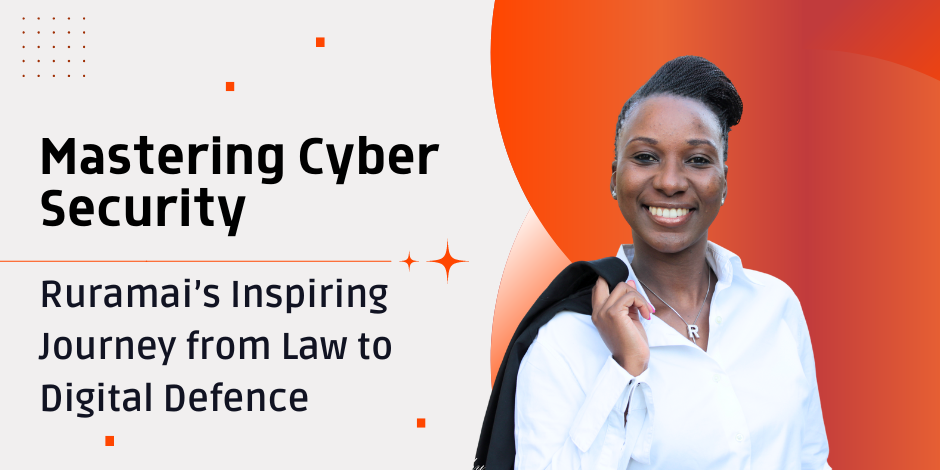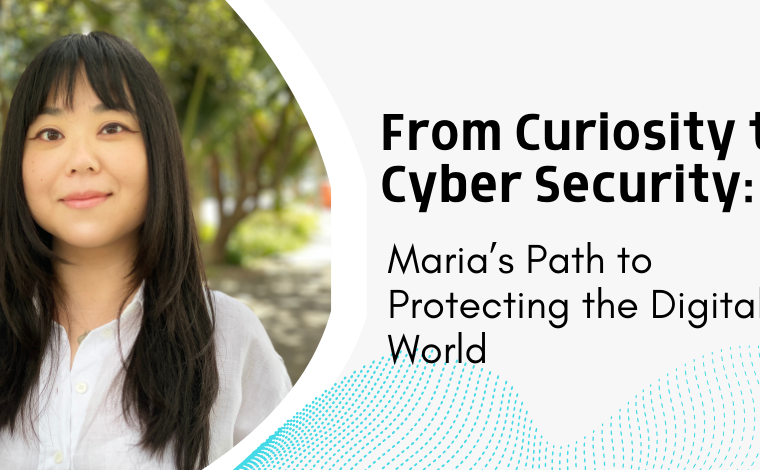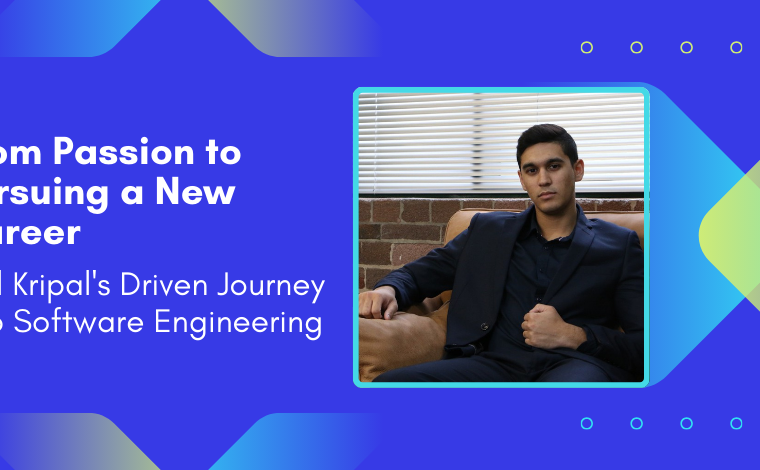Mastering Cyber Security: Ruramai’s Inspiring Journey from Law to Digital Defence

Stay Informed With Our Weekly Newsletter
Receive crucial updates on the ever-evolving landscape of technology and innovation.
With an analytical mind drawn to human rights, one of Ruramai Mangachena’s passions is the complex issues and responsibilities around cyber crime.
After gaining an extensive education and experience in law and relocating to New Zealand from South Africa, Ruramai decided to nurture her interests and make the leap into a cyber security career and now works as a Financial Crimes Operations Analyst for Commonwealth Bank.
We spoke with Ruramai recently, eager to hear about her cyber security journey and her experience with the Institute of Data’s Cyber Security Program and how she landed the role.
Learn how the program helped her land her current role and the importance of her thoughts on our shared responsibility to protect ourselves against cyber crime.
1. Hi Ruramai, please tell me a bit about yourself.
I’ve travelled extensively and lived in various countries, including Zimbabwe, Botswana, South Africa, and now New Zealand.
One constant has been my passion for cooking and sharing meals with my husband. I’ve had this interest since childhood, influenced by watching my mum and my brothers’ varied cooking styles.
In African culture, there’s often a traditional division of labour. We were lucky in our household with my parents ensuring that my brothers and I contributed to all the chores, and we all took turns cleaning and cooking.
As a result, I love to cook and experiment in the kitchen—it’s a new creation with a different twist and flavour every time.
It’s therapeutic for me, offering me a break from daily stresses.
My husband shares my love for food and gives honest feedback on my culinary experiments, which I enjoy sharing with family and friends.
2. In our earlier conversation, you mentioned that you studied law. Why did you decide to study this domain?
So looking back to when I started high school, there was a moment I’ll never forget. It was during an English class.
The teacher, her name was Mrs Mazwi, asked each of us to read aloud a passage from Macbeth. Afterwards, she gave us feedback and asked us what we wanted to do after finishing school.
When it was my turn again, I stood up and confidently declared, “I want to be a lawyer.”
As the lesson ended and everyone started leaving, she called me back and asked if I really wanted to pursue law, and when I said yes, she confided, “You can really command people’s attention. You’re going to be one damn good lawyer.”
Her words stuck with me. Since then, I’ve been determined to become a lawyer. I’m grateful to the teachers who guided me and made sure I focused on the subjects that would prepare me for university and law school.
I worked hard and after earning my LLB (Latin Legum Baccalaureus), I practised law in Botswana and later in South Africa.
I currently hold an LLB Honors and a Master’s in Human Rights. My thesis was in cyber security, and by then, my love of cyber security had really taken off.
3. You have a fascinating journey relocating to New Zealand from Africa. Can you tell me about that part of your life?
So when COVID hit, my husband and I had stable jobs, and we were fortunate to continue working despite the pandemic.
During this time, we began discussing the rising costs around us. We started questioning our lifestyle and wondered if moving abroad might offer us better opportunities.
Before starting our research, we set out our priorities: obtaining residency in less than five years, securing competitive salaries suitable for our career stages, and ensuring financial security for retirement.
Originally we looked at lots of different countries, including Europe (we liked Scandinavia), the UK, and the USA, which were offering post-pandemic incentives.
Eventually, our top three were the UK, USA, and New Zealand. After more research, New Zealand became our top pick as it ticked all the boxes.
We went to an immigration seminar showcasing New Zealand and we were so impressed that we decided New Zealand was the place for us.
4. How did you first become interested in Cyber Security?
Living in South Africa during the rise of cybercrime, I began to notice an increasing number of documentaries discussing cyber crimes.
As someone who watches a lot of documentaries and crime channels, I became familiar with terms like cyber crime, cyber bullying, and revenge porn. Topics that weren’t discussed in our legal circles, which piqued my curiosity.
In Africa, cyber crime happens regularly but is often not reported due to reputational damage concerns.
Companies and governments avoid disclosing these incidents to prevent losing business or appearing incompetent. Companies often pay ransoms to bad actors because they lack proper cyber security measures.
Until recently, South Africa only had vague or non-existent laws to specifically deal with cyber crime, with more comprehensive legislation only coming into effect in 2021!
My interest grew the more I researched the complexities around cyber crime and cyber security, which involves not just technology but also law enforcement and legal professionals like myself.
The sad reality is that South Africa had become a testing ground for hacking groups, where groups experimented with hacking methods before deploying them in first-world countries.
I also wanted to understand cyberbullying and how it differs from traditional bullying.
Online crimes like revenge porn are prosecuted in countries like the US and UK, but this concept is still new to us in Africa, where we are more familiar with traditional crimes.
Working as a lawyer with major financial institutions in South Africa, I was already fairly cyber-alert.
For example, when handling mortgage legal paperwork, we had to verify the applicant’s identity meticulously to prevent identity fraud.
All of these experiences shaped my relationship with the cyber industry, and they highlighted the necessity of understanding and addressing cyber crime.
5. Interesting. So what motivated you to study a Cyber Security Program then?
After the move to New Zealand, I decided to look for a job.
I went to a couple of job interviews, but for some reason, a voice in the back of my mind told me to follow my interest in cyber crime.
My husband encouraged me to look into cyber security, and after researching several online courses, I came across the Institute of Data’s Cyber Security Program.
6. What appealed to you about studying with the Institute of Data specifically?
When entering the cyber security arena, you need to be a bit of an all-rounder. You need a comprehensive understanding of all aspects of cyber security.
[su_quote]I needed that broad knowledge and foundation, and the content of the Institute of Data’s Cyber Security Program gave me exactly that. [/su_quote]The program perfectly matched my requirements, aligning with my experience in financial compliance and legal analysis.
7. Before beginning the program, did you have any initial doubts or concerns?
Sure. Naturally, there are many technical components to cover, but the program’s structure makes understanding them accessible.
[su_quote]During the program, we would cover the theoretical parts in the morning, followed by practice in the labs in the afternoon. [/su_quote]The afternoon sessions allowed us to demonstrate what we had learned by applying the learning in a practical sense by following instructions or assignments.
If anyone was struggling, there was an opportunity to go over the material in a breakaway room through screen sharing before continuing.
8. That is good to hear. Was there anything in particular that you enjoyed about the program?
Cyber Security is a very niche subject. However, our tutor made it fun as time went on because of the extra material he provided.
We would discuss newspaper articles and some of his personal experiences and relate those real-world scenarios to our lessons.
[su_quote]This approach made learning fun and processing the material easier.[/su_quote]9. I understand that you’ve landed a job in the industry. Congratulations! Can you tell us about your new role?
Sure. I work at the Commonwealth Bank of Australia in the financial crimes services operations department of the bank. I’m a financial crimes operations analyst.
We make sure the customers’ information and documents being on boarded by the bank are according to the AML process.
10. What do you enjoy most about working in the Cyber Security industry?
The industry is amazing.
[su_quote]I now participate in the change I’ve been experiencing and make sure justice happens. [/su_quote]
Being in the middle of the action is super engaging. It’s a fascinating space, and I love the problem-solving aspect.
I love participating in executing my responsibilities within the financial crimes system on a daily basis. Especially because my role has a strong emphasis on prevention.
11. Do you have any advice for those interested in joining the Cyber Security industry in New Zealand?
Yes, I would say this: The internet is here to stay, and it’s not going anywhere, which means there will always be the need to contend with cyber crime.
With that in mind, it is the responsibility of every global citizen to have some form of cyber security knowledge.
If you’d like to learn more about our Cyber Security Program, please download a course outline.
Alternatively, you can speak about the program directly with a team member by booking a career consultation to start your journey with an actionable plan.
You can connect with Ruramai and follow her professional journey on Linkedin.




